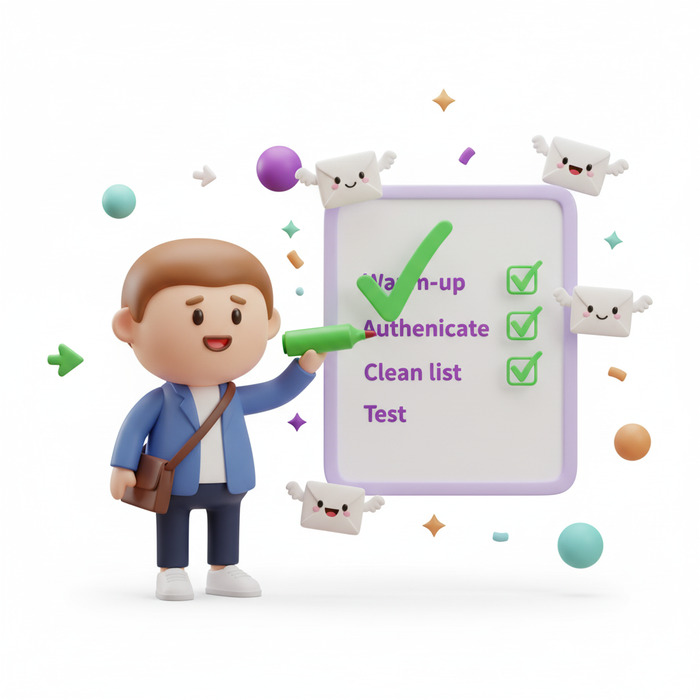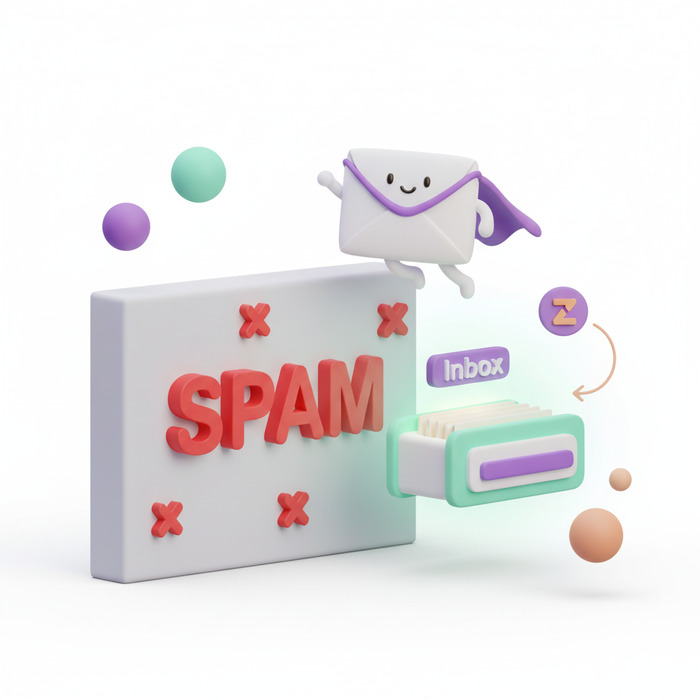Blog
Our Latest Insights
From warm-up tricks to deliverability hacks, our blog breaks down everything you need to know to land in the inbox and connect with your audience.
Email Deliverability vs. Delivery: What’s the Real Difference? (2025 Guide)

Most marketers have experienced this: you run a campaign, check the dashboard, and see a glowing 99% delivery rate. At first glance, you think everything is perfect. But then you look closer at your open rates, and they’re shockingly low.
What went wrong?
The problem is simple — you were looking at delivery, not deliverability. And in 2025, this distinction can make or break your email strategy.
In this guide, we’ll break down the difference between email deliverability and delivery, why it matters so much in today’s inbox world, and how you can improve your results starting today.
What Is Email Delivery?
At its most basic, email delivery simply means your email was accepted by the recipient’s mail server.
It’s like mailing a letter and knowing it reached the postbox. That’s it. You don’t know if it was opened, if it went into the junk pile, or if it was placed front and center on the kitchen counter.
Delivery rate is measured as:

If you send 10,000 emails and 9,900 don’t bounce, your delivery rate is 99%.
✅ Good news: Your email didn’t bounce.
❌ Bad news: You have no idea if it landed in the inbox or the spam folder.
What Is Email Deliverability?
Email deliverability takes things a step further. It measures whether your email actually landed in the inbox (where your subscribers will see it) rather than the spam or junk folder.
This is also known as Inbox Placement Rate (IPR).
Why deliverability matters more:
-
Inbox visibility = real campaign impact.
-
It’s influenced by sender reputation, authentication, engagement, and content.
-
It reflects whether your audience will ever see, open, and act on your message.
Example: Out of 10,000 sent emails, maybe 9,900 are “delivered.” But if 3,000 of those land in spam, your deliverability rate is only 69%.

Why This Difference Matters More Than Ever in 2025
Spam filters have evolved dramatically. In the early 2010s, filters mostly flagged certain keywords or too many images. Today in 2025, inbox providers like Gmail, Outlook, Yahoo, and Apple Mail use AI-driven models that analyze:
-
Behavioral patterns → Do people open, click, or delete your emails?
-
Sender reputation → Has your domain or IP been flagged before?
-
Authentication → Do you have SPF, DKIM, DMARC properly configured?
-
Content relevance → Are you sending value or just blasting promotions?
That means you can no longer rely on delivery alone. A high delivery rate doesn’t guarantee that your emails are being seen.
How to Measure Deliverability (Not Just Delivery)
Most ESP dashboards proudly show “99% delivered.” But that number hides the truth. To measure deliverability, you need:
-
Inbox placement tests → Send to seed addresses across Gmail, Outlook, Yahoo, etc.
-
Engagement monitoring → Track opens, clicks, replies, spam complaints.
-
Reputation checks → Run blacklist lookups, check IP/domain scores.
This is where tools like Zharik’s Deliverability Insights make a difference. Instead of guessing, you can see exactly where your emails land.
7 Ways to Improve Deliverability in 2025
Here’s the actionable part. If you want to move beyond “delivery” and master “deliverability,” follow these steps:
1. Warm Up Your Domain
Don’t send thousands of emails from a brand-new domain. Start slow, build trust.
➡️ Use Zharik Auto Warmup to automate the process safely.
What is Email Warmup and How It Works?
2. Authenticate Your Emails
Set up SPF, DKIM, and DMARC. ISPs distrust unauthenticated senders.
➡️ Bonus: Add BIMI so your logo shows in inboxes.
3. Keep Your List Clean
Never buy email lists. Validate regularly. Remove inactive contacts.
➡️ Even one spam trap can tank your reputation.
4. Send Relevant, Engaging Content
-
Personalize subject lines.
-
Use a conversational tone.
-
Keep a good text-to-image ratio (~60/40).
➡️ Engagement tells inbox providers, “This sender is trusted.”
5. Monitor Your Reputation
-
Use Gmail Postmaster Tools.
-
Check blacklists regularly.
-
Track complaint rates.
6. Control Sending Frequency
Don’t overwhelm people. Too many emails in a short time is a red flag.
7. Test Before Sending
Always run deliverability tests to see inbox placement before blasting a list.

Common Myths About Deliverability
Let’s debunk some popular misconceptions:
❌ Myth 1: “99% delivery = success.”
Reality: You could still be in spam for half your list.
❌ Myth 2: “Spam filters only block certain words.”
Reality: In 2025, engagement and reputation matter far more.
❌ Myth 3: “Switching email platforms fixes deliverability.”
Reality: Bad practices follow your domain. A new ESP won’t erase your reputation.
❌ Myth 4: “The bigger the list, the better.”
Reality: A smaller engaged list beats a bloated inactive one every time.
Final Thoughts: Delivery Gets You There, Deliverability Gets You Seen
Here’s the takeaway:
-
Delivery = your email reached the server.
-
Deliverability = your email reached the inbox where it can actually drive results.
In 2025, the difference is more important than ever. Email is still one of the highest-ROI marketing channels, but only if your messages are seen.
And that’s exactly why we built Zharik — to help businesses improve deliverability with domain warm-up, inbox monitoring, and tools.
What Is Email Validation and Why Your Business Needs It

Don’t just settle for “delivered.”
With Zharik, you can:
-
Warm up your domain automatically.
-
Authenticate your emails.
-
Validate and clean your lists.
-
Monitor inbox placement in real-time.
Ready to turn “delivery” into true deliverability?
Start with Zharik today → Get Started Free
We offer the best services for our customer


